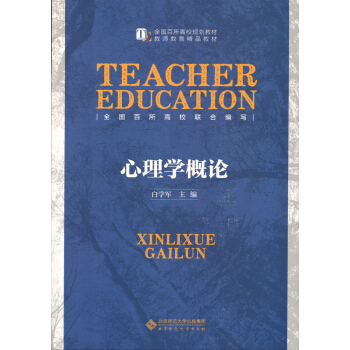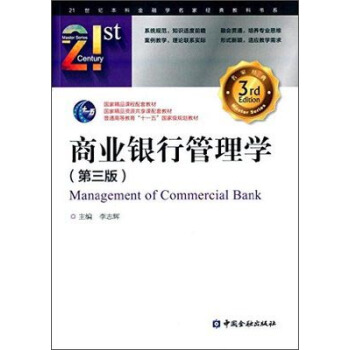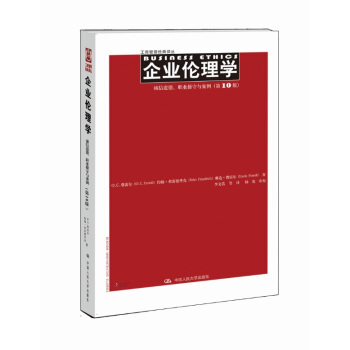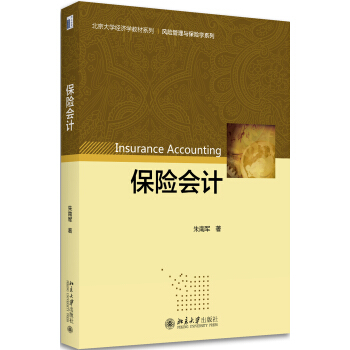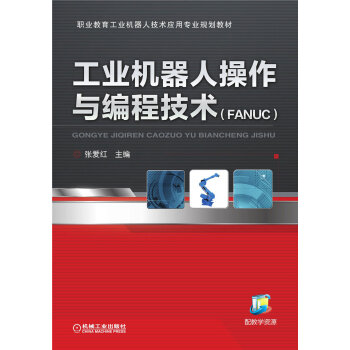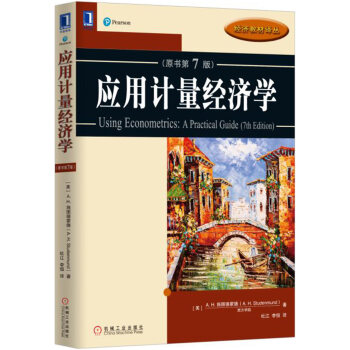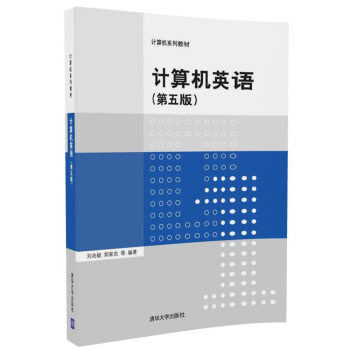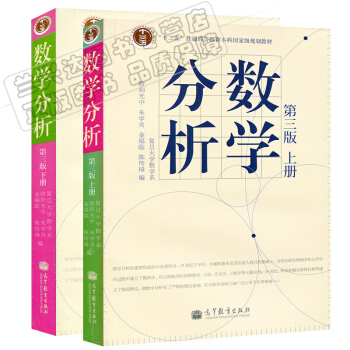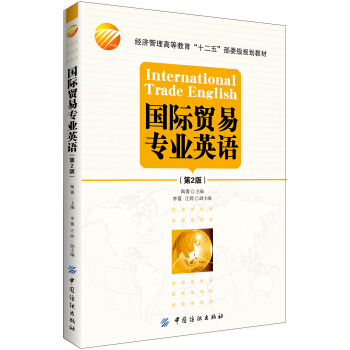

具体描述
编辑推荐
本书为国际贸易专业本科生的专业英语教程,因第一版深受读者欢迎,此次为第二次出版。本书为精读用书,课程的材料包括国际贸易学、市场营销、国际贸易实务中的重要内容。本书在选材上,沿袭了第一版注重专业性、信息性、趣味性、前瞻性等特点,课文多取材于英语原版书籍和论文,并兼顾中国的相关贸易信息,全面涵盖国际贸易的核心领域,包括国际贸易理论知识、国际贸易环境、国际市场营销和国际贸易操作程序等方面的内容,是在专业知识方面达到严谨和新颖,在语言知识方面实现规范和实用的一本集理论性、知识性、新颖性和实用性为一体的国际贸易英语教材。本书的学习对象是全国各大学开设的国际贸易、外贸英语专业本科层次的学生,本书同样适合各种成人教育的相关专业的学生使用,也可为外贸人员培训班和企业在岗人员培训使用。内容简介
本书分4篇,20单元。第一篇分4单元,涉及国际贸易理论和基本概念,第二篇分4单元,涉及国际贸易环境,第三篇分6单元,涉及国际市场营销,第四篇分6单元,涉及进出口贸易实务。每单元分三部分,PartⅠ为精读材料,配有生词表和注解;PartⅡ为精读习题,前三篇注重语法和词汇,第四篇注重课堂思考;PartⅢ为拓展练习,前三篇注重阅读理解和翻译训练,第四篇注重情景对话训练。每单元最后均有因特网阅读指引和经济学名言警句,全书最后附客观题答案和生词表。本书的学习对象是全国各大学开设的国际贸易、外贸英语专业本科层次的学生,本书同样适合各种成人教育的相关专业的学生使用,也可为外贸人员培训班和企业在岗人员培训使用。作者简介
陶菁:宁波大学商学院讲师,管理学博士,拥有15年国际贸易专业英语教学经验。目录
Contents
Part one: Theories and Basic Knowledge of International Trade()
Unit 1
Specialization and Exchange ()
Unit 2The Structure of International Trade()
Unit 3Trade and Policies()
Unit 4Global Competition and National Competitive Advantage()
Part two: Environment of International Trade()
Unit 5Subsidies and International Trade()
Unit 6 US CHINA Trade Conflicts ()
Unit 7Global Value Chains()
Unit 8World Trade Organization()
Part three: International Marketing()
Unit 9The Nature of International Market()
Unit 10The Environment of International Marketing()
Unit 11Identifying and Choosing International Market Appropriate ()
Unit 12Export Pricing Strategies of Multinationals()
Unit 13International Business Negotiation ()
Unit 14E�睠ommerce ()
Part four: Import & Export Practice()
Unit 15Trade Terms()
Unit 16The Import & Export Process ()
Unit 17International Payment()
Unit 18International Cargo Transportation and Insurance ()
Unit 19International Contracting()
Unit 20Inspection, Claim, Force Majeure and Arbitration()
精彩书摘
Part one: Theories and Basic Knowledge of International TradeUnit 1
Specialization and Exchange*
Resources are scare, all economic decisions involve trade�瞣ffs�盩his unit shows many of the most basic ideas of economics, such as efficiency, division of labor, comparative advantage, exchange, and the role of markets��
Tty to answer the following questions before and after reading the text:
—What is the basis for trade?
—How are gains from trade generated?
—How large are the gains and how are they divided among the trading nations?
—What commodities are traded and which commodities are exported and imported by each nation?
PartⅠ Text
The three coordination tasks of any economy
In deciding how to allocate its scarce resources, every society must somehow make three sorts of decisions:
�r First, as we have emphasized, it must figure out how to utilize its resources efficiently; that is, it must find a way to reach its production possibilities frontier��
�r Second, it must decide which of the possible combinations of goods to produce—how many missiles, automobiles, and so on; that is, it must select one specific point on the production possibilities frontier��
�r Third, it must decide how much of the total output of each good to distribute to each person, doing so in a sensible way that does not assign meat to vegetarians and wine to teetotalers��
Societies can and do make each of these decisions—which economists often refer to as how, what, and to whom—in many ways�盕or example, a central planner may tell people how to produce, what to produce, and what to consume, as the authorities used to do, at least to some extent, in the former Soviet Union�盉ut in a market economy, no one group or individual makes all such resource allocation decisions explicitly�盧ather, consumer demands and production costs allocate resources automatically and anonymously through a system of prices and markets�盇s the formerly socialist countries learned, markets do an impressively effective job in carrying out these tasks�盩o see how markets can do all this, let�餾 consider each task in turn��
The wonders of division of labor
Adam Smith, the founder of modern economics, first marveled at how division of labor raises efficiency and productivity when he visited a pin factory�盜n a famous passage near the beginning of his monumental book, The Wealth of Nations (1776), he described what he saw:
One man draws out the wire, another straightens it, a third cuts it, a fourth points it, a fifth grinds it at the top for receiving the head�盩o make the head requires two or three distinct operations; to put it on is a peculiar business, to whiten the pins is another; it is even a trade by itself to put them into the paper��
Smith observed that by dividing the work to be done in this way, each worker became quite skilled in a particular specialty, and the productivity of the group of workers as a whole was greatly enhanced�盇s Smith related it:
I have seen a small manufactory of this kind where ten men only were employed…Those ten persons…could make among them upwards of forty�瞖ight thousand pins in a day…But if they had all wrought separately and independently…they certainly could not each of them have made twenty, perhaps not one pin in a day��
In other words, through the miracle of division of labor and specialization, the workers accomplished what might otherwise have required thousands�盩his was one of the secrets of the Industrial Revolution, which helped lift humanity out of the abject poverty that had been its lot for centuries��
The amazing principle of comparative advantage
But specialization in production fosters efficiency in an even more profound sense�盇dam Smith noticed that how goods are produced can make a huge difference to productivity�盉ut so can which goods are produced�盩he reason is that people (and businesses, and nations)have different abilities�盨ome can repair automobiles, whereas others are wizards with numbers�盨ome are handy with computers, and others can cook�盇n economy will be most efficient if people specialize in doing what they do best and then trade with one another, so that the accountant gets her car repaired and the computer programmer gets to eat tasty and nutritious meals��
This much is obvious�盬hat is less obvious—and is one of the great ideas of economics—is that two people (or two businesses, or two countries)can generally gain from trade even if one of them is more efficient than the other in producing everything�盇 simple example will help explain why��
Some lawyer can type better than their administrative assistants�盨hould such a lawyer fire her assistant and do her own typing? Not likely�盓ven though the lawyer may type better than the assistant, good judgment tells her to concentrate on practicing law and leave the typing to a lower�瞤aid assistant�盬hy? Because the opportunity cost of an hour devoted to typing is an hour less time spent with clients, which is a far more lucrative activity��
This example illustrates the principle of comparative advantage at work�盩he lawyer specializes in arguing cases despite her advantage as a typist because she has a still greater advantage as an attorney�盨he suffers some direct loss by leaving the typing to a less�瞖fficient employee, but she makes up more than that loss by the income she earns selling her legal services to clients��
Precisely the same principle applies to nations�盋omparative advantage underlies the economic analysis of international trade patterns�盇 country that is particularly adept at producing certain items—such as aircraft manufacturing in the United States, coffee growing in Brazil, and oil extraction in Saudi Arabia—should specialize in those activities, producing more than it wants for its own use�盩he country can then take the money it earns from its exports and purchase from other nations items that it does not make for itself��
The underlying logic is precisely the same as in our lawyer�瞭ypist example�盩he United States might, for example, be better than Japan at manufacturing both computers and television sets�盉ut if the United States is vastly more efficient at producing computers, but only slightly more efficient at making TV sets, it pays for the United States to specialize in computer manufacture, for Japan to specialize in TV production, and for the two countries to trade��
This principle, called the law of comparative advantage, was discovered by David Ricardo, one of the giants in the history of economic analysis, almost 200 years ago.��
前言/序言
再版前言国际贸易英语训练需要分门别类方能学以致用,出于教学需要,我们一直在为经贸类研习者与从业者寻找一本合适的精读教材,以满足综合分析贸易经济问题的需要。本书为精读用书,课程的材料包括国际贸易学、市场营销、国际贸易实务中的重要内容。
《国际贸易专业英语》自2008年起,在各院校经济类专业得到普遍使用,受到师生的广泛认同,不少院校连续至今使用该书,我们还发现,一些贸易与经贸谈判从业者把此书作为泛读材料以提高综合分析能力,2010年本书被评为宁波大学优秀教材之一。第一版面世不久后,我们就开始准备第二版的修订和出版准备工作,期间我们收到了众多师生以及经贸实践者所提出的宝贵意见,今天,修订版终于面世,在此我们对使用和关心本书的读者表示诚挚的感谢。
本书在选材上,沿袭了第一版注重专业性、信息性、趣味性、前瞻性等特点,撤换了第一版第8、第15单元的课文内容及其课后习题;修改了第一版中各单元的错误与疏漏,并对部分习题和答案做出更新。本书课文多取材于英语原版书籍和论文,并兼顾中国的相关贸易信息,全面涵盖国际贸易的核心领域,包括国际贸易理论知识、国际贸易环境、国际市场营销和国际贸易操作程序等方面的内容,力求在专业知识方面达到严谨和新颖,在语言知识方面实现规范和实用,成为一本集理论性、知识性、新颖性和实用性为一体的国际贸易英语教材。
每单元分三部分,PartⅠ为包括背景介绍、课文、生词等部分,PartⅡ为课文习题,前三篇注重语法和词汇,第四篇注重课堂思考,PartⅢ为拓展练习。本书练习形式多样,前三篇注重阅读理解和翻译训练,第四篇注重情景对话训练。每单元最后均有名言警句和因特网阅读指引,全书最后附客观题答案和生词表。本教材大纲由陶菁撰写,第1至第8单元由陶菁编写,第9至第14单元由李菁编写,第15至第20单元由汪婷编写。
阅读、理解、分析、组织能力是经济领域写作与深度谈判的基础。本教材内容多节选自国外原版书刊和论文,既有理论阐述也有专题评述,课后分析与讨论等习题皆围绕提高学习者在国际贸易与经济理论与实践领域的阅读理解能力与分析能力及语言组织能力而展开。精读学习虽不能立竿见影,但实为基本功训练的重点,学习者需有执着精神,通过坚持训练以达到学习目的。
本书的对象是经贸类学生、有需要分析与交流国际贸易与经济问题的研习者、有需要进行深度商务沟通的经贸从业者和经贸谈判人员等。对全日制学生,建议学习时间为每周2~3课时,两周完成一章学习;对于自学者,建议将每章的学习时间集中控制在一周以内。本书主要用途为精读教材,但也可作为经贸从业者的泛读材料。
用户评价
我是一名在国际贸易领域工作了几年的人,一直以来都觉得自己的专业英语能力还有提升的空间,尤其是在与国外客户沟通和处理英文合同的时候,总觉得不够得心应手。偶然的机会,我接触到了《国际贸易专业英语(第2版)》,这本书给我带来了很多惊喜。它不仅仅是一本枯燥的词汇书,更像是一本实用的工作手册。书中对国际贸易的各个环节都进行了详细的阐述,并且用非常地道的英文进行了表达,这对于我来说非常有价值。我尤其欣赏书中关于商务谈判、合同谈判和风险管理的章节,这些内容非常贴近实际工作,提供了很多宝贵的语言表达和策略建议。我曾经在与一家欧洲客户进行合同谈判时,因为对某些法律条款的英文表达不够熟悉而陷入被动,读了这本书之后,我才意识到原来有很多更精确、更专业的表达方式可以用来阐述我的观点,并且能够更好地保护我方的利益。书中的案例分析也非常具有启发性,通过阅读真实的商业场景,我不仅学习了新的词汇和表达,更重要的是理解了在实际工作中如何运用这些语言来解决问题。这本书的语言难度适中,既有深度又不至于过于晦涩,非常适合有一定基础的从业人员进行提升。我每天都会抽出一些时间来阅读,并且会把一些我认为特别重要的句子和表达方式摘抄下来,在工作中加以运用。总而言之,这本书对我工作能力的提升起到了非常关键的作用,我强烈推荐给所有希望在国际贸易领域有所建树的朋友们。
评分作为一名对国际贸易充满好奇心的大学新生,《国际贸易专业英语(第2版)》是我踏入这个领域的第一本专业书籍,它彻底颠覆了我对“专业英语”的刻板印象。我之前以为学习专业英语就是背诵大量的单词和短语,枯燥乏味。但这本书完全不同,它以一种非常生动有趣的方式,将国际贸易的知识和语言巧妙地融合在一起。书中的内容讲解清晰易懂,即使是初学者也能很快地掌握。我特别喜欢书中大量的图表和插图,它们将抽象的贸易流程和概念形象化,让我更容易理解和记忆。比如,书中关于国际货物运输流程的图解,清晰地展示了从订舱、报关到装运、清关的每一个环节,并且配上了相应的专业英语词汇和短语,让我一下子就明白了这些词汇在实际操作中的应用。此外,书中还提供了很多模拟对话和场景练习,这让我有机会在阅读的同时,就尝试着去运用学到的知识,大大增强了我的学习兴趣和自信心。我感觉这本书不仅仅是教授语言,更是在引导我思考和理解国际贸易的本质。每当我遇到不理解的地方,都会翻阅前面的章节,书中的逻辑性非常强,可以帮助我找到问题的根源。这本书让我对国际贸易专业英语的学习充满了热情,我迫不及待地想继续深入学习,用书中的知识去探索更广阔的世界。
评分我是一名在校的国际贸易专业的学生,在学习过程中,我一直觉得自己在英语阅读方面还不错,但一到写作,就显得捉襟见肘,特别是要写一些专业的报告或者邮件时,总觉得词不达意,不够专业。接触了《国际贸易专业英语(第2版)》之后,这个问题得到了很大的缓解。《国际贸易专业英语(第2版)》在写作方面的指导尤为突出。书中提供了大量的写作范例,涵盖了从起草商务信函、撰写市场分析报告,到起草贸易合同条款等各种实际场景。我仔细研究了这些范例,学习了它们在遣词造句、段落组织、逻辑衔接上的精妙之处。尤其是对于一些商务邮件的写作,书中提供了多种不同的语气和风格,可以根据不同的收件人和沟通目的进行选择,这让我能够更加灵活地运用英语进行商务沟通。我还会尝试着将书中学习到的句型和词汇,运用到自己的实际写作中。比如,在给外教写邮件时,我就会尝试使用书中介绍的一些更正式、更专业的表达方式,收到的反馈总是非常积极的。这本书不仅仅是提供模板,更重要的是它教会了我写作的逻辑和思路,让我能够举一反三,写出更具条理性和说服力的文章。现在,我对待英文写作不再感到恐惧,反而充满信心,这离不开这本书的悉心指导。
评分这本书真的是一本宝藏,自从我拿到它之后,就仿佛打开了新世界的大门。我是一名国际贸易专业的学生,在学习过程中,经常会遇到各种专业术语和复杂的表达方式,有时候即使是中文的释义,也需要反复琢磨才能理解其中的深意。而《国际贸易专业英语(第2版)》的出现,简直是雪中送炭。书中的例句非常丰富,而且涵盖了国际贸易的方方面面,从最基础的贸易术语、合同条款,到复杂的国际结算、运输保险,再到最新的电子商务、绿色贸易等前沿话题,都有深入浅出的讲解。我特别喜欢书中对每一个术语的解释,不仅仅给出简单的定义,还会提供多个实际应用场景的例句,让我能够清晰地理解这个词汇在不同语境下的准确用法。而且,书中的语言风格也非常地道,很多表达方式都是我平时在实际案例分析或者阅读英文文献时遇到的,但自己却很难写出来或者准确运用。通过这本书的学习,我感觉自己的阅读理解能力和写作能力都得到了质的飞跃,现在再看一些英文的贸易合同或者行业报告,心里就有了底气,不再像以前那样畏惧。这本书的编排也非常合理,内容循序渐进,从易到难,让我能够一步步建立起扎实的专业英语基础。我还会时不时地翻看书中的一些重点章节,温故知新,巩固记忆。真的非常推荐给所有国际贸易专业的学生,甚至是从事相关行业的朋友,这本书绝对是你提升专业英语水平的得力助手。
评分我一直对国际贸易领域非常感兴趣,在选择专业的时候,毫不犹豫地选择了国际贸易。而在学习过程中,我也深知专业英语的重要性。在我寻找学习资料的时候,《国际贸易专业英语(第2版)》这本书引起了我的注意。这本书的内容非常丰富,涵盖了国际贸易的各个方面,并且用非常地道的英文进行了阐述。我特别喜欢书中关于国际贸易理论和实践的结合,它不仅仅是介绍枯燥的理论知识,更是通过生动的案例和实际应用场景,来帮助我们理解这些知识。比如,书中在讲解国际结算方式的时候,就结合了信用证、托收等不同结算方式的实际操作流程,并且提供了相关的英文术语和表达,这让我能够清晰地了解到不同结算方式的优缺点以及在实际操作中的注意事项。而且,书中还涉及到一些新兴的贸易模式,比如跨境电商的英文表达和相关规则,这让我能够紧跟时代的步伐,了解最新的行业动态。这本书的语言风格非常专业且易懂,作者的讲解清晰明了,逻辑性强,让我能够轻松地掌握其中的知识。我将这本书作为我的主要学习资料,每天都会抽出时间来阅读和学习,并且尝试着去运用书中的知识来分析一些实际的贸易案例。
评分《国际贸易专业英语(第2版)》的出现,对我这样一名希望提升自己英文沟通能力,以便更好地理解国际贸易复杂性的读者来说,无疑是一次巨大的提升。我之前在阅读一些英文的贸易文章时,常常会因为一些生僻的专业词汇而停下脚步,或者因为对句子的理解不够到位而产生误解。这本书的出现,就像一位经验丰富的向导,带领我穿梭于国际贸易的语言海洋。它不仅仅是提供了一堆枯燥的词汇表,而是将这些词汇巧妙地融入到生动有趣的贸易情境中。我尤其喜欢书中对贸易术语的释义,它不仅仅给出中文翻译,更重要的是解释了该术语的起源、发展以及在现代贸易中的实际应用,并且配上了大量的例句,让我能够深刻地理解其内涵。书中的内容涵盖了贸易流程的每一个环节,从合同的签订到履行,再到后期的结算和风险管理,都进行了详细的阐述。这让我能够从宏观到微观,全面地理解国际贸易的运作方式,并且能够用准确的英文来描述这些过程。我还会时不时地翻看书中的一些案例,学习作者如何用简洁、专业的语言来分析和解决贸易问题。这本书让我对国际贸易的理解更加深入,也让我能够更加自信地与国际同行进行交流。
评分这本书的出现,对我来说,简直就是一场及时的“救赎”。我是一名毕业不久的国际贸易从业者,在工作中经常会遇到各种各样的英文文件,从海运提单、保险单据,到各类协议和合同,都需要我仔细研读。然而,由于之前在学校的学习主要集中在理论知识和基础的口语交流上,对于这些复杂的法律条文和专业术语的理解,总是感到力不从心。很多时候,即使我查了字典,也难以把握其准确含义和在合同中的法律效力。而《国际贸易专业英语(第2版)》恰恰弥补了我的这一短板。书中对各种贸易单证的详细解释,以及对合同条款的深入剖析,都让我豁然开朗。它不仅仅是罗列词汇,而是将这些词汇置于具体的法律和商业环境中进行解读,让我能够理解其背后的逻辑和意义。我特别欣赏书中对国际贸易惯例(如UCP600, Incoterms等)的解释,以及相关的案例分析,这让我能够更准确地理解这些规则在实际合同中的应用。现在,当我再面对复杂的英文贸易文件时,我不再感到迷茫和焦虑,而是能够更加自信地去理解和处理。这本书对我日常工作的帮助是巨大的,它让我能够更精准地把握贸易细节,减少潜在的风险。
评分这是一本非常实用的工具书,对于我们这些需要频繁接触国际贸易相关文献的读者来说,简直是福音。我是一名从事进出口业务的基层操作人员,每天需要处理大量的英文单据和与国外客户进行邮件沟通。过去,我对很多专业术语的理解不够到位,导致在沟通中出现一些误解,甚至影响了工作的效率。自从有了《国际贸易专业英语(第2版)》,我的工作效率和准确性都得到了显著提升。书中对各种贸易术语的解释都非常详细,并且提供了大量的例句,让我能够理解这些术语在不同语境下的具体含义。我尤其喜欢书中关于各种贸易单证的介绍,比如提单、发票、箱单、保险单等,以及它们在英文表达上的要点和注意事项。这些信息对于我来说是极其宝贵的,能够帮助我更准确地填写和审核这些单据,避免不必要的错误。此外,书中还提供了很多实用的商务邮件模板和常用语,我经常会参考这些模板来起草我的邮件,这大大节省了我的时间和精力,并且能够确保我的邮件表达专业、得体。这本书我已经推荐给了我的同事们,大家一致认为这是一本非常值得拥有的专业书籍。
评分坦白说,在拿到《国际贸易专业英语(第2版)》之前,我对市面上的一些专业英语教材感到有些失望。它们要么过于理论化,与实际脱节;要么内容陈旧,无法反映最新的行业发展。而这本《国际贸易专业英语(第2版)》却给了我耳目一新的感觉。它在内容的更新上做得非常出色,不仅包含了传统的国际贸易理论和实践,还紧密关注了当前国际贸易的新趋势,例如跨境电商、数字贸易、供应链金融等。书中的案例很多都是最新的,非常有现实意义。我尤其对书中关于国际贸易风险防范和应对的章节印象深刻,它详细分析了各种潜在的风险,并提供了专业的英文应对策略和法律条文的引用,这对于我们这些经常需要处理国际贸易合同的人来说,是非常实用的指导。而且,这本书在语言表达上也非常讲究,力求做到准确、严谨、地道。它不仅仅是教我们认识单词,更重要的是教我们如何运用这些单词和短语来清晰、有效地表达复杂的贸易概念和商业意图。我发现,通过阅读和学习这本书,我不仅提高了我的专业词汇量,更重要的是提升了我运用英语进行商务沟通和谈判的能力。书中的一些地道表达,我会在日常工作中刻意去模仿和运用,效果非常显著。这本书确实是一本能够与时俱进、实用性极强的专业英语学习资料。
评分这本书的价值,远远超出了我最初的预期。我是一名对国际贸易抱有浓厚兴趣的普通读者,虽然我并非专业出身,但我一直渴望能够更深入地了解这个领域。在寻找相关书籍的过程中,《国际贸易专业英语(第2版)》以其详实的内容和专业的讲解吸引了我。《国际贸易专业英语(第2版)》提供了一个非常系统和全面的视角来审视国际贸易。它不仅仅是语言的教授,更是对国际贸易的知识普及。书中的内容涵盖了国际贸易的方方面面,从基础的贸易术语、合同范本,到复杂的国际金融、法律法规,都有涉及。我特别欣赏书中对一些重要贸易概念的深入剖析,比如贸易壁垒、贸易协定、国际组织的运作等,这些内容让我能够更好地理解国际贸易的宏观环境和发展趋势。而且,书中的语言风格非常专业且严谨,这让我能够接触到地道的商务英文表达,并从中学习到如何用更精确、更得体的语言来表达自己的观点。我将这本书作为我的“敲门砖”,它为我打开了了解国际贸易的大门,让我能够更自信地去阅读相关的专业文章和书籍。这本书的深度和广度,让我受益匪浅,它不仅提升了我的专业英语能力,更重要的是拓展了我的国际视野。
评分不错,京东真是快啊啊啊啊啊啊啊
评分不错的教材,选用的文章好
评分实用 对贸易英语的提高有帮助
评分看起来不错 但愿对学习有帮助!!
评分为什么非要写满10个字呢,你不知道我没有10个字好写吗
评分好书,可以买,英语很好
评分价格不贵,值得一睹!!!
评分正品行货,送货快速!
评分挺好的挺好的挺好的挺好的挺好的挺好的
相关图书
本站所有内容均为互联网搜索引擎提供的公开搜索信息,本站不存储任何数据与内容,任何内容与数据均与本站无关,如有需要请联系相关搜索引擎包括但不限于百度,google,bing,sogou 等
© 2026 book.tinynews.org All Rights Reserved. 静思书屋 版权所有

![口腔材料学(第2版)/普通高等教育“十一五”国家级规划教材 [Dental Materials] pdf epub mobi 电子书 下载](https://pic.tinynews.org/11472688/53a37c96Nba612b46.jpg)
![清华版双语教学用书:工程电磁场(第8版) [Engineering Electromagnetics] pdf epub mobi 电子书 下载](https://pic.tinynews.org/11504015/53cf1950Nc4618695.jpg)

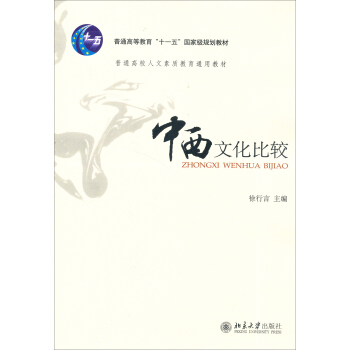
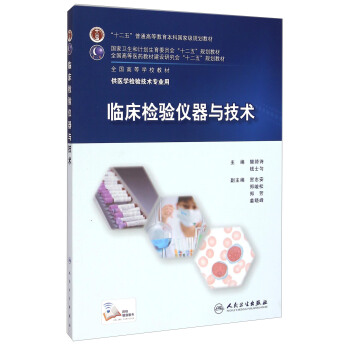




![化学专业英语 [English for Chemistry] pdf epub mobi 电子书 下载](https://pic.tinynews.org/11771213/56260e2bNaaee781f.jpg)
